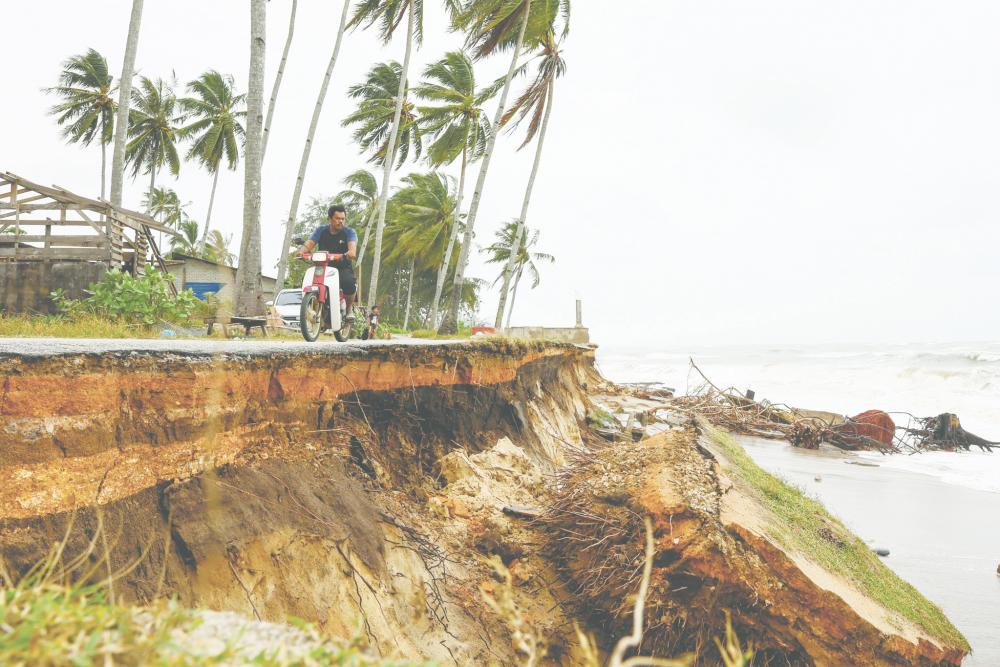PETALING JAYA: Experts are urging immediate action on incomplete coastal protection projects at Jalan Kampung Tanjung in Batu Rakit, Terengganu as severe beach erosion has forced many local businesses to shut down.
Universiti Malaysia Terengganu Institute of Oceanography and Environment director Prof Dr Mohd Fadzil Mohd Akhir said the area around Kampung Tanjung has faced unprecedented erosion.
“The area is known for having some of the most extreme erosion in the country, primarily due to the incomplete construction of breakwaters.
“However, partial construction, like in Batu Rakit, disrupts sediment flow. The rocks and rubble interfere with sand movement, preventing proper sediment buildup and worsening erosion in vulnerable areas,” he said.
Mohd Fadzil added that the monsoon season halted construction, leaving the breakwater structures unfinished and unable to serve their intended purpose, further compounding the situation.
“The erosion has brought the beach dangerously close to (populated areas), raising concerns about infrastructure damage and safety.
“Immediate short-term measures, such as placing (construction) rubble or rocks to reinforce the shoreline, are essential before the next round of strong winds or monsoons,” he said, while stressing the importance of proper planning to prevent similar problems in other states.
“Coastal projects like breakwaters take years to complete, so construction phases should minimise disruption to ecosystems and sedimentation. Key stages must be finished before the monsoon season.
“Regular monitoring of erosion hotspots, with short-term protective measures, should continue while long-term projects are in progress.”
Meanwhile, Universiti Malaysia Terengganu Tourism Management Programme lecturer Dr Mohd Rahimi Abdul Halim said the incomplete breakwater projects has severely affected the Kampung Tanjung shoreline.
He said other coastal areas might also face erosion risks and called for more measures, such as alternative routes for villagers, as the erosion continues to damage the road along the beach.
“While authorities have limited beach activities in Terengganu, further action is needed. This requires cooperation between the Public Works Department and the Department of Irrigation and Drainage to establish safe access points and ensure the safety and convenience of road users.”
Mohd Rahimi also said the erosion damage has caused many small businesses, such as seaside stalls and restaurants, to close or relocate.
“Traders and fishermen have suffered significant losses as their equipment and stalls were destroyed.”
He said Jalan Kampung Tanjung, once a popular destination for domestic tourists due to its proximity to the shore, has seen its natural beauty severely compromised.
“The loss of beaches and infrastructure has discouraged tourists, directly impacting the livelihoods of those dependent on the tourism industry. Environmental challenges like this disproportionately affect rural communities reliant on the coast for their income,” he added.
“Breakwaters are structures designed to reduce wave energy and stabilise sediment movement. Once completed, they support the natural sedimentation processes, creating stable beaches and reducing erosion.
“Breakwaters reduce wave impact and prevent erosion, revitalising tourism by creating safer conditions for activities like swimming and surfing, which attract visitors and boost local businesses.
“They also draw anglers during the off-monsoon season, offering locals income opportunities through bait sales, equipment rentals and boat services,” he added.
On Oct 19 last year, Deputy Prime Minister Datuk Seri Dr Ahmad Zahid Hamidi said the government could face costs of up to RM1 trillion if coastal erosion control projects are not initiated promptly.









